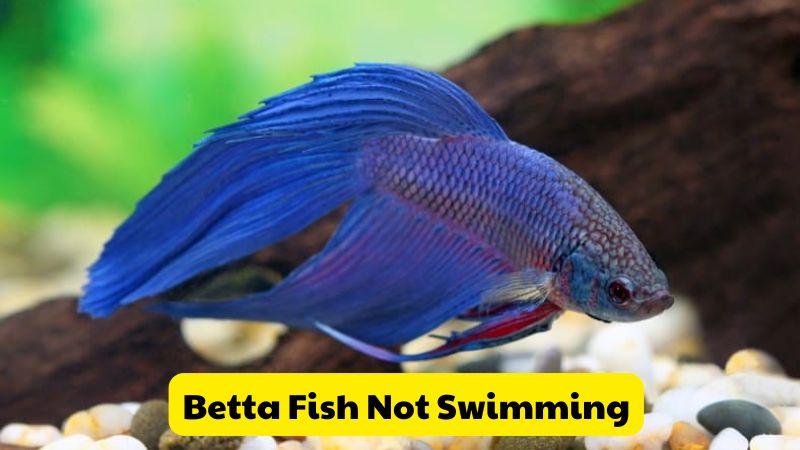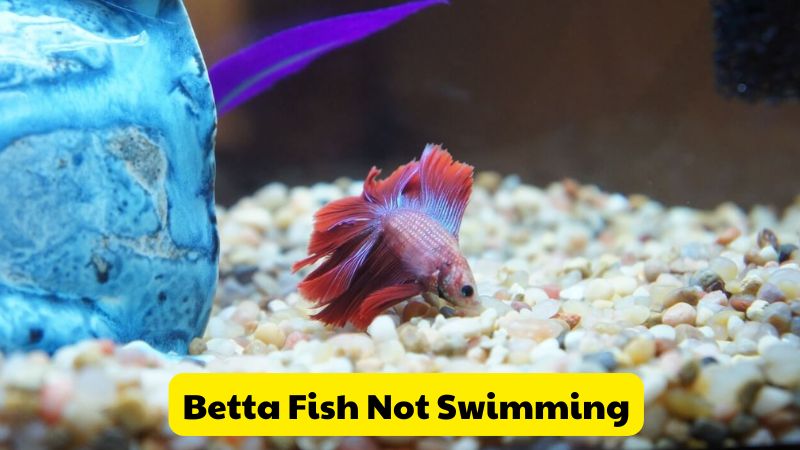Fish Food
Understanding Why Your Betta Fish Not Swimming
Betta fish not swimming, it can be a worrying sign for any aquarist. This behavior can indicate underlying problems, from environmental factors to health problems. Observing a betta fish that is lethargic or struggling to swim properly creates an urgent need to investigate and resolve the root cause.
Identifying the cause behind this problem with Fishtankfables is important to ensure fish health and maintain a healthy water environment.
Reasons Why betta fish not swimming
Environmental Factors
- Water Quality: Betta fish are highly sensitive to changes in water conditions. Unstable pH levels, inappropriate temperatures, and high concentrations of ammonia, nitrite, or nitrate can significantly affect their health and behavior. Poor water quality can lead to lethargy or reluctance to swim.
- Living Space: Bettas require adequate space to thrive. A tank that is too small can cause stress and limit their movement. Insufficient oxygen levels or inadequate filtration can also contribute to decreased activity and swimming.
- Lighting: Bettas are sensitive to lighting conditions. Excessively bright or dim lighting can stress them, potentially causing them to become less active. Proper lighting helps maintain their natural behaviors and overall well-being.
Health Factors
- Diseases: Bettas can be afflicted by various health issues, such as parasitic infections, bacterial diseases, or fungal infections. These conditions can cause discomfort and affect their swimming ability. Regular health checks and prompt treatment are essential.
- Injuries: Physical injuries from accidents, tank mates, or rough handling can lead to reluctance to swim. Bettas may become lethargic or avoid movement due to pain or discomfort from injuries.
- Nutritional Deficiencies: A lack of essential nutrients in their diet can weaken bettas and impact their energy levels. Proper nutrition is crucial for maintaining their vitality and encouraging normal swimming behavior.

Psychological Factors
- Stress: Stressful situations, such as sudden changes in their environment, aggressive interactions with other fish, or frequent disturbances, can affect a betta’s behavior. Stress often results in reduced activity and swimming.
- Old Age: Older bettas may naturally become less active due to age-related decline in physical capabilities. This reduced activity is a common occurrence in aging fish and can lead to less frequent swimming.
Addressing these factors can help ensure that betta fish remain active and healthy. Regular monitoring of their environment, health, and overall well-being is key to preventing and mitigating issues that may affect their swimming behavior.
Signs of Illness in Betta Fish
White Spots
- Fungal Infections: White spots or patches on the skin or fins of a betta fish can indicate a fungal infection. This condition often presents as cotton-like growths and may be accompanied by other symptoms such as loss of appetite or changes in behavior.
Torn or Decaying Fins
- Bacterial Infections: Ripped or decaying fins are common signs of a bacterial infection. This type of infection can result from poor water quality or injury and may cause further complications if not treated promptly. The fins may appear frayed, discolored, or have noticeable lesions.
Lethargy and Balance Issues
- Parasitic Infections: If a betta fish appears lethargic or has difficulty maintaining balance, it could be suffering from a parasitic infection. Parasites can affect the fish’s internal organs and nervous system, leading to decreased activity and coordination problems.
Swollen Abdomen
- Swim Bladder Disease: A swollen abdomen in a betta fish can be a sign of swim bladder disease, which affects the fish’s ability to control buoyancy. This condition can result in difficulty swimming, floating on one side, or a distended belly, and may require dietary adjustments or medical treatment to manage.
How to Address Betta Fish Not Swimming
Check and Adjust the Environment
- Frequent Water Changes: Regularly change the water to ensure that it remains clean and free of toxins. This helps maintain optimal water conditions and can prevent stress-related issues that may affect swimming.
- Clean the Tank: Regularly clean the tank to remove any debris, algae, or waste that could impact water quality. A clean environment promotes better health and activity levels in betta fish.
- Inspect Equipment: Check the filtration and heating equipment to ensure they are functioning correctly. Proper filtration and consistent temperature are crucial for a healthy and active betta fish.
Treat Diseases
- Use Specific Medications: Administer medications designed for the specific illness affecting the betta. Different diseases require targeted treatments, so identify the issue accurately to select the appropriate medication.
- Quarantine Sick Fish: Isolate sick bettas from healthy ones to prevent the spread of disease. A separate quarantine tank allows for effective treatment without risking the health of other fish.
Provide Proper Nutrition
- Choose Quality Food: Offer high-quality, varied food to ensure your betta receives all necessary nutrients. A balanced diet supports overall health and energy levels, contributing to more active behavior.
- Feed Appropriate Amounts: Feed your betta the correct amount of food to avoid overfeeding or underfeeding. Proper feeding habits help maintain a healthy weight and energy levels, promoting normal swimming behavior.
Preventing Diseases in Betta Fish
Select Healthy Fish When Purchasing
- Observe Appearance and Behavior: When buying a betta fish, carefully inspect its color, fins, and overall behavior. A healthy betta should have vibrant colors, intact fins, and active, responsive behavior. Avoid fish showing signs of discoloration, torn fins, or lethargy.
Maintain Regular Tank Hygiene
- Routine Water Changes: Regularly change the water in the tank to prevent the buildup of toxins and waste. Consistent water changes help maintain a clean environment and reduce the risk of disease.
- Clean Tank Equipment: Regularly clean all items in the tank, including filters, substrates, and decorations. Remove debris and algae to prevent contamination and ensure optimal water quality.
Provide a Healthy Living Environment
- Ensure Water Quality: Maintain proper water conditions by monitoring parameters such as pH, temperature, and ammonia levels. Stable water quality is crucial for preventing stress and disease.
- Control Lighting and Space: Provide appropriate lighting and sufficient space for your betta. Avoid exposing the fish to excessive light or overcrowding, which can contribute to stress and health issues.
By implementing these preventative measures, you can help ensure a healthy, thriving environment for your betta fish and minimize the risk of disease.
Conclusion
Addressing the issue of a betta fish not swimming involves a thorough examination of its environment, health, and diet. By ensuring optimal water conditions, providing appropriate medical treatment, and maintaining a balanced diet, you can often resolve the problem and restore your betta’s vitality.
Timely intervention is key to preventing further complications and ensuring that your betta fish remains active and healthy. Regular monitoring and care will help maintain a thriving aquatic habitat for your pet.

